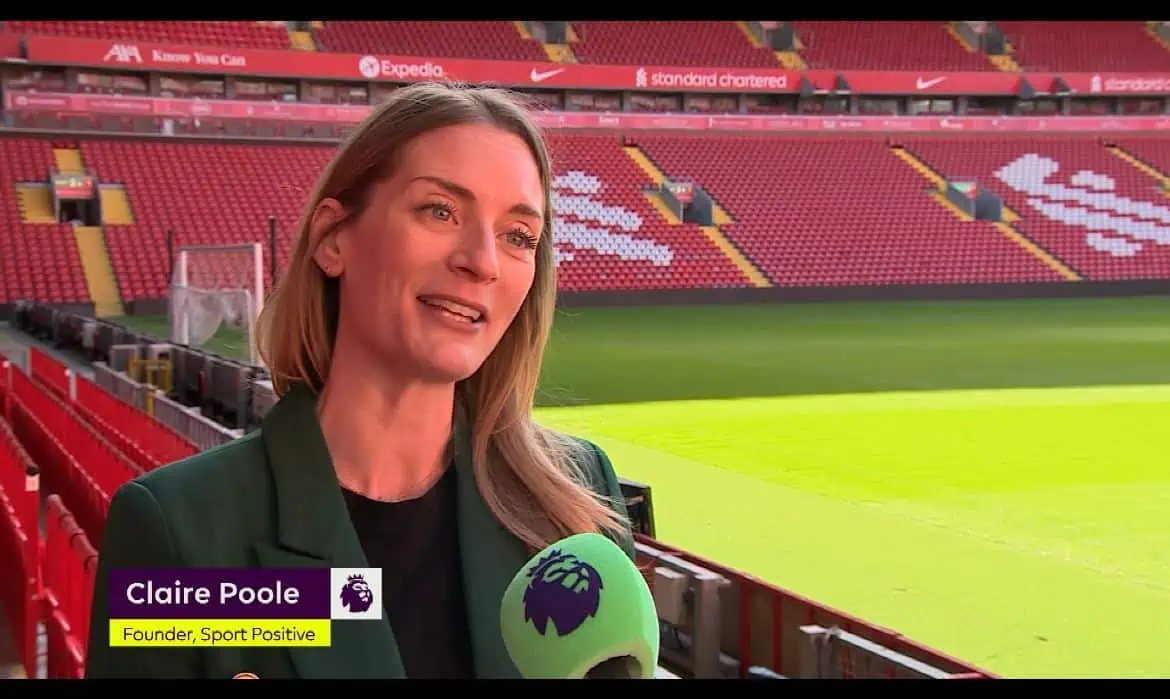Claire Poole: “Action at scale” is needed
Claire Poole is the founder of Sport Positive. She also organizes the Sport Positive Summit in London once a year with Sport Positive. Poole is considered a pioneer and one of the leading figures in the sports industry when it comes to sustainability issues.
When you think about the year 2050 and the state of sport worldwide, what is your mood – gloomy, positive, mixed?
Poole: I think we have to focus on some sort of informed optimism. The ways we can shape the future. I guess I have to believe in 2050, the outlook is positive because otherwise, what are we doing? But I also think what we do in the next five years is really going to inform what that looks like. In the past ten years, we’ve had a lot of movement and commitment. But we have to start seeing action at scale now – and no more three years of strategizing and coming up with what it could be. Of course, there has to be time for strategy, and that’s part of it. But not “let’s wait and not do anything until we know how we will be perfect”.
What do you think sport will look like in 2050? Will sport then increasingly take place indoors and perhaps only in certain regions?
Poole: I do think we’re going to see a lot of change. I think we’re already seeing the adaptation of traditional winter sport resorts. They offer other activities, whether mountain biking, horse riding, trekking, or caving. If the whole economy of this tourism is based on winter sports, what will they do if that disappears? And then the opposite end of that scale, of course, is the likes of Saudi Arabia building an entire winter ski resort in a desert. They have a cold climate in the winter, but it’s too dry. It will all be supported by dry ski slopes and artificial snow.
In your opinion, will the schedule of the professional tours change due to the weather?
Poole: Calendars are going to have to change if we continue on the predicted trajectory of the climate crisis. Seb Coe, President of World Athletics has already said that they may need to decouple the more intensive or longer races or from the northern hemisphere summer calendar because it just doesn’t work.
Saudi Arabia and the United Arab Emirates have bid to host numerous sporting competitions, including golf. Many of them are outdoor competitions. It was too hot for many players at last year’s World Amateur Golf Championship. Can you imagine open-air events being held there in the future?
Poole: As you said, countries in the Middle East want to be a global leader in sports. So they’re either purchasing sports series or they are hosting events. Where we seem to be at the moment is the idea that anything is possible, even if it’s not environmentally sound. As you said, it’s far too hot, but they have enough money to create infrastructure to support it, like they did for the Qatar World Cup, desalinating a lot of water to irrigate pitches and creating green landscapes.
As far as the size of a golf course is concerned, a complete indoor golf course does not seem to be possible …
Poole: I think that is fascinating because you are categorically saying it’s not possible, Don’t get me wrong, I’m not a proponent of these things, and I’m not saying this is what will happen. I just think that the thought process of “that will never happen” has been overcome time and time again in terms of what lengths humans will go to innovate and create things they want to happen. Especially where there is the desire, the finance and benefits to the creators…
You have been following the transformation of numerous sports that want to become more sustainable for years. What were the biggest challenges in the past, and which ones have already been overcome?
Poole: The main challenges we’ve seen over the years at their root are honestly still frequently the same. Time and money, prioritization of sustainability within the organisation, communications and the understanding of sports’ responsibility. If you crack the prioritization of sustainability at the highest level of sport decision makers, the other challenges can be overcome. Then there is the question: Is sustainability really our job? The answer to that is that it’s everyone’s job to play a role and think I sport has an incredible opportunity, and the privilege to be able to play a role in driving this change forward.
How important is the leadership of sports organisations in terms of success?
Poole: If you get the prioritization right, then everything falls into place. If you’ve got a chairperson, commissioner, CEO, executive director of a sports organization that says we’re prioritizing sustainability, come what may, it happens. If you don’t have that level of prioritization, then you’re constantly coming up against barriers of, we don’t have time, we don’t have the money, we don’t have the expertise. We don’t want to miscommunicate, there is a lack of comfort with what to communicate and how. All of these challenges can be overcome if you have the people who prioritize it internally at the top of an organisation.
To what extent have the extreme weather events of recent years led to an acceleration of the processes surrounding the sustainable expansion of sports?
Poole: I think it’s had an impact more broadly, where sporting events are cancelled or postponed and impacted athletes talk about how difficult it is to compete. These things get media coverage and then it becomes a topic on the agenda. But I also think human beings are incredibly adaptive and like reverting to the status quo. It’s horrible to think of destructive events as ‘helpful’ to the cause. However as more extreme weather events happen and sports are affected, Boards need to prioritize the topic because it’s a risk to the organization. If they aren’t adequately considering these risks and impacts, I would query if they are discharging their fiduciary duty of care as board members.
You are not a golfer, but England is a country with many golfers. What is your view from the outside on the aspect of sustainability in golf?
Poole: I’m not a golfer, but we know many golfing organizations and of course the Golf Environment Organization. I understand the incredible work that’s happening in golf in terms of reducing impact. Golf is changing now dramatically, to overcome historic issues of it being viewed as an elite members-only sport.
When we see media pick up about golf and the environment, it’s often around the high volume of water needed to irrigate courses. We see media reports and activist groups planting flowers on golf courses and filling holes with concrete when there are water shortages.Within the industry we know there is lots of work going on with rainwater collection, water reuse etc. But golf, like all sport, faces the same PR issue, of what is progressing versus what catches headlines or get clicks.
Which three sports do you name when it comes to special achievements in terms of sustainability?
Poole: Football has to be up there. Football is the largest sport in the world, so something would be wrong if it wasn’t at the top of that list. But I also think you’ve got the proliferation of commitments at different levels of football as well on a global level, a European level, at a national level, at a club level, also at a grassroots level. But after that, depending on the lens you’re looking through, I don’t think there’s like a top three in sports in sustainability, because there are many different projects in different sports. There are incredible things happening in tennis, rugby, cricket, athletics, basketball, sailing, golf, motorsport, cycling…the list goes on!
Media coverage often focuses on professional sport. But how important is grassroots sport for the sustainable transformation of sport, and isn’t it often overlooked?
Poole: It’s really important. It’s something we’re trying to do more of. When you get to a grassroots level, where you’re thinking about local community sports, all it’s built on volunteering and support from local councils, communities, coaches to keep that sport going. We hear of leisure centers or facilities closing due to lack of funding or having to do more with less etc. So, connecting with grassroots sports at scale and mobilizing action around that area becomes much more difficult because it isn’t set up in the same way as professional sports. Although we could all do something within our communities, it’s much more difficult to scale it because you haven’t got the top-down reach; it’s the bottom-up and smaller.
There is also a second point: Of course we want to encourage more action at grassroots. But when people are volunteering their time, or being paid modestly to do so much organizing, coaching, supporting, you’re then asking them to do more. We must be very careful about putting the onus on individuals to do this. It should be governments, it should be major organizations, it should be business to lead this because they are having the biggest impact. Mobilizing funding to support more activity at a grassroots level should be happening more.
2024 is the year of elections. To what extent can a policy shift in the EU or the USA towards less climate policy also have a negative impact on the sustainable transformation of sport in the long term?
Poole: I don’t think sport really relies on government policy or incentives to do this work specifically. I think sport is quite self-actualizing in terms of driving this forward. However, it’s almost the opposite end of the scale where rather than having policy in place to help, the wrong political leader can massively hinder progress. If you have a political leader in place who very visibly does not prioritize climate change or biodiversity, then prioritizing sustainability becomes a political issue, especially for the international associations governing bodies. It can also become more political to even talk about, as we saw in the US with Donald Trump as president. We saw the entire EPA (Environmental Protection Agency) website being dismantled because there wasn’t focus on the environment. So if it’s at that level, of course it will have a negative impact.
You can make three decisions today to realize your vision for 2050. What decisions will you make?
Poole: Education is always one of them. So if I were ‘Queen for the day’, I would say, all board members and all C-suite individuals have to be trained on carbon literacy, sustainability, climate, and biodiversity impacts. So the people within these decision-making roles know, even if they’re not particularly passionate about it, what’s happening, what the impact is going to be and what the risks are ahead.
Funding would be the second one. To ensure a sustainable sport in 2050, you have to start looking at how funding is allocated. When the money can be in place, then the activities will follow.
The third point is that every sports organization, no matter what size, has some sustainability strategy or policy. Then, it becomes part of the infrastructure. Everyone knows it has to happen. Everyone has to consider it in decision-making. Those sorts of changes will mean that the right decisions are made to make sport sustainable in 2050.








